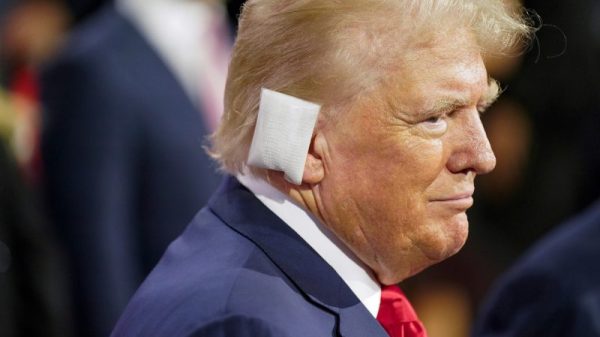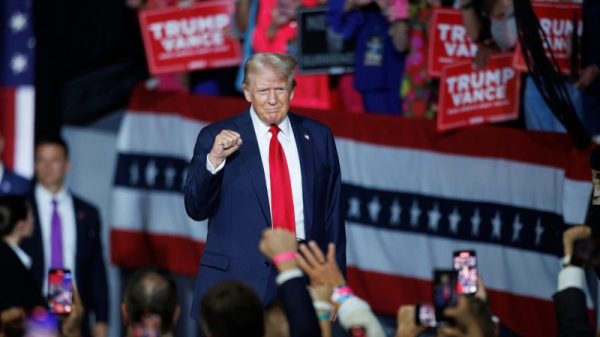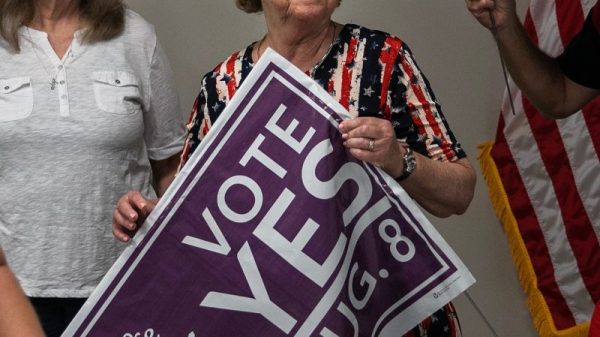Donald Trump called into a CNBC show on Monday morning, allowing host Joe Kernen to ask a question about government spending and, specifically, the large chunk of spending that is committed to social programs.
“Have you changed your outlook on how to handle entitlement — Social Security, Medicare, Medicaid, Mr. President?” Kernen asked. “It seems like something has to be done.”
At that point, two familiar patterns kicked in. Trump tends to like to align with the opinions offered by his interviewers, particularly on subjects that aren’t at the center of his political identity. He also tends to ramble when doing an interview over the phone, making it harder for hosts to cut in. So his response to Kernen was long, convoluted — and offered in agreement.
“The first one, there’s a lot you can do in terms of entitlements, in terms of cutting and in terms of the theft and the bad management of entitlements. Tremendous bad management of entitlements,” he said. “There’s tremendous amount of things and numbers of things you can do. So I don’t necessarily agree with the statement. I know that they’re going to end up weakening Social Security, because the country is weak.” He continued on to say something about inflation.
So what’s his position? Well, he said that there is a lot that you can do “in terms of cutting” and that there has been bad management. But he also said he “didn’t agree with the statement,” though it’s not clear which one, and that “they” were going to weaken Social Security. It’s … murky.
To the Trump campaign, of course, it wasn’t.
“If you losers didn’t cut his answer short,” a social media post from the campaign said, “you would know President Trump was talking about cutting waste.” The “losers” in the post referred to President Biden’s reelection campaign, but the Trump campaign pointed The Washington Post’s reporters to the same comment when asked about the interview.
It’s obvious why the campaign is trying to categorize Trump’s answer in this way, given what polling shows about Social Security, even though his actual response wasn’t terribly comprehensible. But even the campaign’s clarification probably doesn’t get Trump out of hot water.
Kernen called reforms to Medicare and Social Security the “third rail” of politics, which is an old shorthand meant to capture the central political challenge the programs pose: Both are very expensive, and both are very popular.
In February, YouGov asked Americans to rate the importance of various policy issues. Social Security ranked near the top, with nearly all respondents saying it was a “very” or “somewhat” important issue. That was true across partisan groups, but more true for older Americans — who are more likely to receive Social Security benefits — than younger ones.
The pollsters also asked how the government should approach Social Security, either increasing the available benefits or reforming the program to reduce costs — precisely what Trump’s campaign claimed he was promoting.
Americans prefer increasing benefits to reforming the program by more than 2-to-1. Among older Americans, voters who are central to Trump’s political support, the margin is 3 or 4 to 1.
Those who want to see increased benefits are also those who view Social Security as a very important issue. In other words, it’s not just that there is a group that views it as important and a group that wants to see benefits increase: They are the same people. Americans support increasing Social Security benefits — and think this issue is very important.
It’s a bit odd that Trump didn’t have a stronger answer for this, given that he has repeatedly indicated his support for protecting those programs. There are more older Americans than ever before, and President Biden has made clear the political utility he sees in campaigning as the defender of Social Security. (His campaign quickly jumped on Trump’s new comments.) But Trump seems to have been riffing in his response and was expressing general agreement with his interviewer’s concerns.
What’s particularly striking about Trump’s answer is that the era of Republicans focusing on reductions in spending on Medicare and Social Security is largely over. That was the Republican Party of the 2012 presidential contest, in which both the nominee (Mitt Romney) and his vice-presidential pick (Paul D. Ryan) used spending to attack President Barack Obama. It was in keeping with the ostensible concerns of the tea party, that the government was spending too much and, therefore, taxing too much.
Trump’s emergence in 2015 and 2016, though, was rooted in the more visceral concerns of the tea partyers, the ones centered on how America was changing culturally. The Ryan-era effort to use tea party energy to achieve long-standing GOP policy goals was set aside in favor of MAGAism and anti-liberal outcry. On Fox News and Fox Business, mentions of cutting or reforming the programs mostly vanished.
The federal debt surged under Trump, a good reflection of his and his supporters’ general indifference to federal spending.
Expect Trump and his team to very quickly move to reinforce his strong support for maintaining the programs, a position consistent with his past rhetoric. Particularly now that the Republican primary is over, there’s no benefit in being the guy who wants to see any reductions to a program that is used by many of America’s most reliable voters.
The real question is why Trump had such a clumsy response to the question in the first place.





























